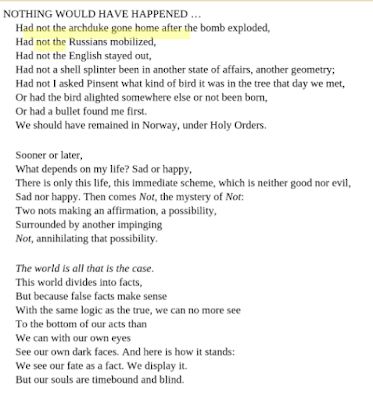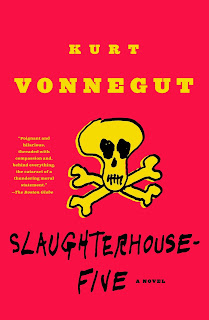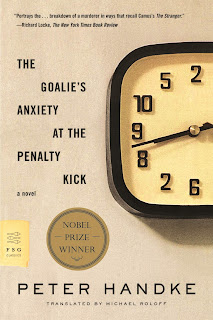Couldn't finish. Same sex women, atmospherically done. Lost interest.
Talk not with scorn of Authors- it was the chattering of the Geese that saved the Capitol. Coleridge
www.seanenright.com
seanenright.blogspot.com
Wednesday, December 14, 2022
Animal Dreams by Barbara Kingsolver
Beautiful heavy book. 1992? First Kingsolver I've ever read, in preparating for DEMON COPPERHEAD.
Monday, November 28, 2022
The Abstainer by Ian McGuire
Tuesday, November 15, 2022
Here Goes Nothing by Steve Toltz
 Toltz's prose style is stunning. I stopped turning over page corners to mark especially pungent sentences, as there were too many. Fatalistic, funny, unswerving look at mortality and its alternatives.
Toltz's prose style is stunning. I stopped turning over page corners to mark especially pungent sentences, as there were too many. Fatalistic, funny, unswerving look at mortality and its alternatives.
The way I saw it, faith in the Lord was like walking around in a suit of gold that looks fancy but weighs you down. [27]
Congratulations, bitches. It's an arranged marriage, and you arranged it. [33]
My mind was a tour de force of what the fuck. [68]
Like a secret tradition on the road to the road to perdition/
To think and talk in mediocrities/
Fake philosopher, you are bluffing, "I know I know nothing"
Fool, ignorance doesn't make you Socrates. [114]
Whenever I hear someone reciting a poem, I also hear the hours of practice they put into memorizing it just for the occasion of saying it to you. It's excruciating. [114]
Gracie went downstairs and knocked at the front door from the inside. Who is to say this is not how summon ghosts? [166]
"Now raise your glasses. That was a joke. Put your glasses down. Who toasts a baby? What are you, alcoholics?" [227]
Being born is okay for personal growth, but aside from that, what's it good for? [227]
Tears and laughter are the only common language between all people on earth. [227]
'He who does not answer the questions has passed the test.' - Franz Kafka [249]
Take it from me-- when you get sad enough, you'll vote for the precipitous over the slow decline every time. [255]
It had occurred to me that all my self-criticisms were innuendo and hearsay, everything I'd ever pretended to be was for someone else's benefit, and if people were ever looking at you, it was actually to see if you were looking at them, and if they were paying you attention, it was only to gauge your level of attention. [364]
"Notions of beauty are socially constructed, to be sure, but ugly is ugly." [369]
Gracie put her head down on the bar, muttering, 'I didn't want to be more sinned against than sinning. I wanted to sin too.' [369]
"You're playing God."
"God isn't. Someone has to." [371]
Thursday, November 10, 2022
Liberation Day, Stories by George Saunders
The story "Love Letter" is worth the price of admission alone. Not blown away by anything else, some retreads of his earlier theme-park-as-existence m.o.
Tuesday, November 01, 2022
Bubblegum by Adam Levin
Another strong, fascinating, disturbing, sometimes annoying work.
Wednesday, October 05, 2022
Mercury Pictures Presents by Anthony Marra
Well, it seemed to go on forever, but I got through it. Terribly overwritten, in my opinion, not just in the prose but in the jarring shifting points-of-view and flashback/forwards. I thought A CONSTELLATION OF VITAL PHENOMENON was so tremendous that I opened this novel with trembling hands. He's gifted - and the story was intriguing and intricate - but the structure was not great. Reading CHRIST STOPPED AT EBOLI at the same time - one of the many texts Marra acknowledges in his afterword - couldn't have helped, as EBOLI is a masterpiece of concision and beauty.
Mount Chicago by Adam Levin
Extraordinary, and extraordinarily weird, story. Funny and sad. And weird. Levin riffs and raffs hilariously. It's a book about his mind more than it is about Chicago. But marvelous.
Tuesday, August 30, 2022
Monday, August 22, 2022
Mr. President by Miguel Angel Asturias
Christ Stopped at Eboli by Carlo Levi
Where do I start about this remarkable book? A political prisoner in Italy, a doctor and painter, in 1942-1943 is sentenced/banished by the fascist Mussolini regime to a remote peasant region in the southern part of the country. Whereupon he makes notes for an anthropological, social history of the region and its people. The peasants' superstitions and conduct are vividly conjured.
Saturday, August 13, 2022
Tuesday, August 09, 2022
Tuesday, August 02, 2022
The Candy House by Jennifer Egan
Meh. Apparently there are recurring characters from GOON SQUAD, but I don't remember it clearly enough for continuity. Some interesting stuff but thought the second half trailed off instead of building up to something.
Thursday, July 28, 2022
A Wrinkle in Time by Madeleine L'Engle
Re-reading another favorite book from my childhood - now that Disney has made a movie of it, we get a new edition -- with photos from the movie production, including Reese Witherspoon as Mrs. Whatsit and Oprah Winfrey as Mrs. Which. And Zach Galiafinkis as the Happy Medium. And whatshername as Mrs. Who.
Another horror of the modern age.
Might have to see it, just for the blood-bath of criticism it will stir up in me.
I last read and considered this novel in 2010.
Read a different edition this time, and had just as pleasurable an experience this time as I did 12 years ago. If pleasure is the right word for one of the best, and most unusual, novels about WWII.
In the special introduction to the 1976 Franklin Library edition of the novel, Vonnegut wrote:
The Dresden atrocity, tremendously expensive and meticulously planned, was so meaningless, finally, that only one person on the entire planet got any benefit from it. I am that person. I wrote this book, which earned a lot of money for me and made my reputation, such as it is. One way or another, I got two or three dollars for every person killed. Some business I'm in.
Tuesday, July 19, 2022
Look at Me by Anita Brookner
 I enjoyed this novel, yet found myself constantly turning back to the copyright page, to reassure myself that I had read it correctly and that the novel was published in 1983. I think it takes place in the 1960s, but indeed it reads like a novel of the thirties or forties. Concerning a watchful, self-torturing, quiet female librarian in London, embarking on her first real friendship and love affair, who is just beginning to take writing seriously and plans a career doing it, it is correct and laced-up in diction, in character, in dialogue. On the surface,there is no hint of anything swinging about London except the occasional "sex shop" the narrator passes in walking around the city. There is no mention of technology beyond the occasional shared telephone.
I enjoyed this novel, yet found myself constantly turning back to the copyright page, to reassure myself that I had read it correctly and that the novel was published in 1983. I think it takes place in the 1960s, but indeed it reads like a novel of the thirties or forties. Concerning a watchful, self-torturing, quiet female librarian in London, embarking on her first real friendship and love affair, who is just beginning to take writing seriously and plans a career doing it, it is correct and laced-up in diction, in character, in dialogue. On the surface,there is no hint of anything swinging about London except the occasional "sex shop" the narrator passes in walking around the city. There is no mention of technology beyond the occasional shared telephone.
That said, the book is a withering, compact 200-page study of loneliness, social vs. private character, and the power of the bold and attractive and lively, over the cautious and quiet.
The savageness is not in the setting, but in the seething feelings the narrator reads in the faces and words of those around her.
"I saw the business of writing for what it truly was and is to me. It is your penance for not being lucky. It is an attempt to reach others and to make them love you. It is your instinctive protest, when you find you have no voice at the world's tribunals, and that no one will speak for you. I would give my entire output of words, past, present, and to come, in exchange for easier access to the world, for permission to state 'I hurt' or 'I hate' or 'I want.' Or, indeed, 'Look at me.' And I do not go back on this. For once a thing is known it can never be unknown. It can only be forgotten. And writing is the enemy of forgetfulness, of thoughtlessness. For the writer there is no oblivion. Only endless memory."
Tuesday, July 12, 2022
The Violin Conspiracy by Brendan Slocumb
Cool plot, excellent music writing about performance, violins, and music culture.
Less enchanted with Slocumb's prose, which is often workaday and one-dimensional, gushing, emphatic, and repetitive.
Friday, July 01, 2022
Late in the Day by Tess Hadley
Didn't love it as much as FREE LOVE. Hadley writes briliiantly about an over-privileged, self-conscious, whiny demographic - it gets to me, over time. Still, gorgeous prose.
Tuesday, June 21, 2022
Thursday, June 16, 2022
Tuesday, June 07, 2022
Tuesday, May 31, 2022
Cloud Cuckoo Land by Anthony Doerr
Really enjoyed reading this, after some trepidation after reading alot of the review. As a follow up to the stunning ALL THE LIGHT WE CANNOT SEE, it pales somewhat, as it is more in the line of CLOUD ATLAS, a blurring interwoven text about some humans shared devotion for a fragmentary Greek text. It covers from Ancient Greece until some time well in the future aboard an interplanetary spaceship, and visits the sacking of Constaninople,1950s-to-present day Idaho, a murderous climate activist, and the Korean War.
Quicksand by Steve Toltz
Shades of PANAMA by Thomas McGuane, one of my favorite novels. Toltz's style is frenetic, brilliant and blinding: he stacks up aphorisms and similes like nobody's business, it's too packed with great lines to quote here with any comprehensiveness.
the deep waters of everything lived through
were backed up in the soul. . . I can't answer! (91)
"What is?"
"Your life."
if I run into it. I say: I've racked my narrative
for signs of hubris. (255)
Wednesday, April 27, 2022
Tuesday, April 19, 2022
The Goalie's Anxiety at the Penalty Kick by Peter Handke
Strange unsettling sort of boring story of a construction worker who used to be a soccer goalie and gets fired and murders a woman. Rest of narrative follows his unraveling sanity - I guess - as language and time become unreal to him and he waits to be apprehended. Sort of remember seeing a film version of it in college.
The World As I Found It by Bruce Duffy
An amazing experience of a novel, about the imagined life of Ludwig Wittgenstein, Bertrand Russell, and G.E. Moore. Duffy's writing seems almost out of another time, recalling Henry James, and even some of the Victorians. It's a dense, moving, obsessive book


Monday, March 21, 2022
The Catherine Wheel by Jean Staffod
A Handful of Dust by Evelyn Waugh
Can't believe I had never read this. Marvelous. Driven to it by its echoes in the Thomas McGuane short story "Fugitives."
Monday, March 14, 2022
Monday, March 07, 2022
Monday, February 28, 2022
Wednesday, February 23, 2022
The Little Drummer Girl by John Le Carre
Mind numbingly long and complicated acting-within-acting-within-terror-cells. May or may not finish it. Awesome early 1970s Greece slutty hippies, which is something.
Friday, February 18, 2022
Featured Post
Buy my books.
Buy the books on Amazon, and watch videos of some readings. Please.
-
My son and I saw THE HIDDEN FORTRESS at AFI Silver yesterday afternoon, what a masterpiece! The 21-year old Misa Uehara as the Princess was ...
-
May he have an accident shaped like an umbrella. [p. 13] Finally reading this after owning it for almost 40 years. Collection of short ...
















































